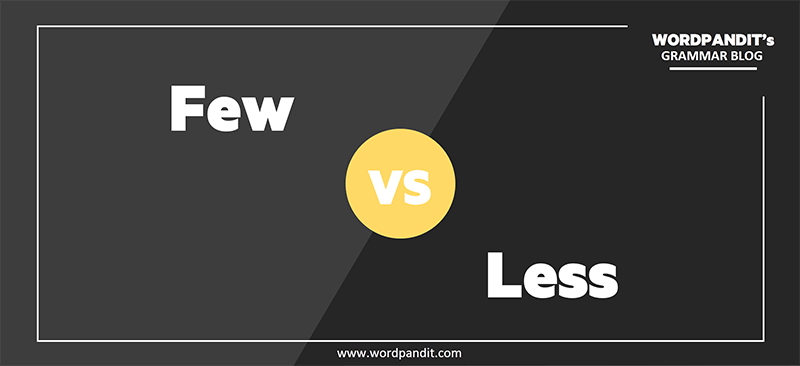‘Less’ and ‘few’ are two words that can be easily confused with.
Actually, the lesser you mull over this issue, the fewer issues you will encounter.
Ideally speaking, when we use ‘lesser than’ and ‘fewer than’, we are talking about things that are ‘less’ or ‘few’. But what exactly is the nature of these ‘things’?
Go through the following examples:
1) There is fewer clutter on my desk than there was yesterday.
2) There are less glasses here today.
3) Fewer people will flock to Oscars this year.
4) She is less of a pessimist this year than she was last year.
In the first case, it should be less instead of fewer, as clutter cannot be counted.
In the second case, it should be fewer than less, as glasses can be counted.
Third and fourth sentences are correct.
According to the sentences above, it becomes clearer that ‘lesser’ is used in case of uncountable nouns and ‘fewer’ is used with countable nouns. To solve this riddle even further, difference between countable nouns and uncountable nouns needs to be known:
Countable Nouns: Countable nouns are names of people, places and things that can be counted. E.g. one books, one wise man, one fat lady, two villages, two wise men etc. According to the definition, fewer is an adjective that is used with countable noun.
Uncountable Noun: Uncountable nouns are names of things that cannot be counted. E.g. water cannot be one, wood cannot be two and glass cannot be three. According to the definition, less is an adjective that is used to quantify uncountable nouns.
Remember the tip to decide a countable or an uncountable noun: nouns for which a plural form exists are countable (star: stars, pen: pens) and nouns for which there is no plural form, they are uncountable (honey: honey, milk: milk).
However, at times countable and uncountable nouns can be intermingled .i.e. some nouns can fit in both the roles. For e.g. when we talk about water, it cannot be counted. However, a glass of water can be counted.. So, for this part you do not have to worry if you go by the basic definition of countable and uncountable nouns. You will be able know when to use fewer and when to use less .e.g. fewer glasses of water and less water.
Take the exercise below, before we move further:
1) There is ______ stuff on my desk today.
2) There are ______ things on my desk today.
3) Please take out ______ cups.
4) Please make ______ tea.
5) You lasted ______ than three hours in that exam.
6) That place is ______ than 3 miles from here.
7) Please do ______ work.
8 ) She has directed no ______ than two exceptional pieces of work.
Answers;
1) Less
2) Fewer
3) Fewer
4) Less
5) Less
6) Less
7) Less
8 ) Fewer
Sentences from 1 to 4 are easy to understand. However, the usage of less in sentences 5 and 6 can be confusing, as time and miles in both the cases can be counted. Here, the rule becomes an exception in the case of time, distance and money. Then in Sentence 7 and 8, work is both count and mass noun.
A Special Add on for our users:
Uncountable nouns fall into the following groups:
- Things which are considered in mass or quantity nd not in numbers: sugar, sand , hair, dust etc.
- Materials: wood, cloth, silver, gold, iron etc.
- Liquids: water, milk, oil, ink, honey etc.
- Gases: steam, mist, nitrogen, air etc.
- Natural phenomena: heat, cold, electricity, lightning etc.
- Abstract nouns: stages of life, states of mind, qualities, procesees, actions, ideas etc.
Courage, happiness, freedom, attention, childhood, honesty, enjoyment
Note: A number of words used to refer to qualities, states, actions etc are however countable. These may be considered as exceptions. Eg: joys, sorrows, dreams, miseries etc.
- Branches of learning: economics, mathematics, politics etc.
NOTE: there are some uncountable nouns which we refer to in parts. When we do so, we use them with expressions such as a piece of, a grain of, a kilo of, etc. Here is a list of such expressions:
- a piece of chalk
- a cake of soap
- a block of ice
- a piece of advice
- a piece of information
- a piece of furniture
- a piece of bread
- a log od wood
These expressions have their plural forms: pieces of chalk, cakes of soap etc.
Proper nouns are not categorised under either countable or uncountable nouns.








Brilliantly explained and takes care of all the doubts learners can have.
Keep up the good work
is ‘few’ correct in ques. 3 ?
yes
Really good comparison…an interesting fact..cheers wordpandit team 🙂
u guys rock \m/
thanks a lot tejashwi..:)